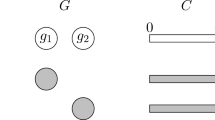Abstract
The Lisbon Treaty has legally endorsed degressiveness as a principle of distributing indivisible goods. Yet the principle has been implemented in executive acts with insufficient precision. As a result, it cannot be unambiguously applied in practice. Therefore many theoretical studies have been conducted aiming at a more precisely defined formulation of the principle so that resulting allocations could be explicitly derived from primary rules. This paper belongs to such research stream. It aims at submitting a formal definition of unrounded degressively proportional distribution.
Access this chapter
Tax calculation will be finalised at checkout
Purchases are for personal use only
Similar content being viewed by others
Notes
- 1.
Detailed mathematical analysis of the allocation functions the reader will find in [9].
- 2.
Haman argues that the value of parameter u can be then interpreted as a measure of degression of allocations. A smaller value of this parameter indicates more degression of the allocation. The smaller the value u, the more degressive allocation (closer to equal division). A given allocation is less degressive (closer to a proportional allocation), as u approaches unity. Haman continues the research into degressive proportionality in a weak case (UDP) and in a strong case (RDP) [11].
References
Treaty of Lisbon. Official J. Eur. Union. C 306, 50 (2007)
Lamassoure, A., Severin, A.: Report on the composition of the European Parliament. Committee on Constitutional Affairs, A6-0351 (2007)
Maciuk, A.: Przykłady podziałów mandatów do Parlamentu Europejskiego spełniających warunki Traktatu Lizbońskiego [Examples of the divisions of seats to the European Parliament that meet the conditions of the Treaty of Lisbon]. Prace Naukowe Uniwersytetu Ekonomicznego we Wrocławiu. Ekonometria 33(198), 85–96 (2011)
Florek, J.: A numerical method to determine a degressive proportional distribution of seats in the European Parliament. Math. Soc. Sci. 63(2), 121–129 (2012)
Łyko, J., Rudek, R.: A fast exact algorithm for the allocation of seats for the EU Parliament. Expert Syst. Appl. 40, 5284–5291 (2013)
Grimmett, G.R.: European apportionment via the Cambridge Compromise. Math. Soc. Sci. 63(2), 68–73 (2012)
Pukelsheim, F.: A parliament of degressive representativeness? Institut für Mathematik, Universität Augsburg, Preprint Nr 015/2007 (2007)
Pukelsheim, F.: Putting citizens first: representation and power in the European Union. In: Cichocki, M., Życzkowski, K. (eds.) Institutional Design and Voting Power in the European Union, pp. 235–253. Ashgate, London (2010)
Słomczyński, W., Życzkowski, K.: Mathematical aspects of degressive proportionality. Math. Soc. Sci. 63(2), 94–101 (2012)
Haman, J.: Degresywnie proporcjonalny podział mandatów w Parlamencie Europejskim [Degressively proportional division of seats in the European Parliament]. Decyzje 8, 53–78 (2007)
Haman, J.: The concept of degressive and progressive proportionality and its normative and descriptive applications. Studies of Logic, Grammar and Rhetoric (2017). https://doi.org/10.1515/slgr-2017-0019. (in print)
Gualtieri, R., Trzaskowski, R.: Report on the composition of the European Parliament with a view to the 2014 elections. A7-0041/2013 (2013)
Report on the composition of the European Parliament (28 January 2018) (2017/2054(INL) – 2017/0900(NLE)). http://www.europarl.europa.eu
Pukelsheim, F.: Proportional Representation. Apportionment Methods and Their Applications. Springer, Cham (2014)
Author information
Authors and Affiliations
Corresponding author
Editor information
Editors and Affiliations
Rights and permissions
Copyright information
© 2018 Springer-Verlag GmbH Germany, part of Springer Nature
About this chapter
Cite this chapter
Cegiełka, K., Dniestrzański, P., Łyko, J., Maciuk, A. (2018). Remarks on Unrounded Degressively Proportional Allocation. In: Nguyen, N., Kowalczyk, R., Mercik, J., Motylska-Kuźma, A. (eds) Transactions on Computational Collective Intelligence XXXI. Lecture Notes in Computer Science(), vol 11290. Springer, Berlin, Heidelberg. https://doi.org/10.1007/978-3-662-58464-4_6
Download citation
DOI: https://doi.org/10.1007/978-3-662-58464-4_6
Published:
Publisher Name: Springer, Berlin, Heidelberg
Print ISBN: 978-3-662-58463-7
Online ISBN: 978-3-662-58464-4
eBook Packages: Computer ScienceComputer Science (R0)




